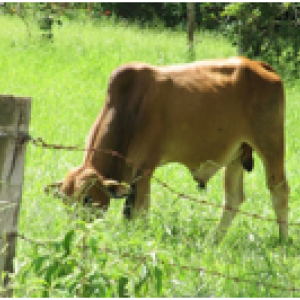
This study models two policies for increasing cattle ranching productivity in Brazil in order to analyse whether intensification of pasture-based cattle ranching would allow for rainforest protection and further enable Brazil to reduce its greenhouse gas emissions and improve agricultural productivity.
Furthermore it explores if such developments in Brazil could have a global impact on GHG emissions by sparing land from deforestation. The two models explored are a. the implementation of a tax on conventional pasture and b. a subsidy for semi-intensive pasture. The study concludes that when weighing both the positive and negative effects the GHG benefits arising from these measures (largely due to land sparing) would be about ten times greater than the emissions triggered by policies stemming from (a) increased cattle production abroad (under the tax) and (b) increased beef consumption (under the subsidy).
Abstract
This study examines whether policies to encourage cattle ranching intensification in Brazil can abate global greenhouse gas (GHG) emissions by sparing land from deforestation. We use an economic model of global land use to investigate, from 2010 to 2030, the global agricultural outcomes, land use changes, and GHG abatement resulting from two potential Brazilian policies: a tax on cattle from conventional pasture and a subsidy for cattle from semi-intensive pasture. We find that under either policy, Brazil could achieve considerable sparing of forests and abatement of GHGs, in line with its national policy targets. The land spared, particularly under the tax, is far less than proportional to the productivity increased. However, the tax, despite prompting less adoption of semi-intensive ranching, delivers slightly more forest sparing and GHG abatement than the subsidy. This difference is explained by increased deforestation associated with increased beef consumption under the subsidy and reduced deforestation associated with reduced beef consumption under the tax. Complementary policies to directly limit deforestation could help limit these effects. GHG abatement from either the tax or subsidy appears inexpensive but, over time, the tax would become cheaper than the subsidy. A revenue-neutral combination of the policies could be an element of a sustainable development strategy for Brazil and other emerging economies seeking to balance agricultural development and forest protection.
Citation
Cohn, A. S., Mosnier, A., Havlik, P., Valin, H., Herrero, M., Schmid, E., O'Hare, M., Obersteiner, M., 2014, Cattle ranching intensification in Brazil can reduce global greenhouse gas emissions by sparing land from deforestation, Proceedings of the National Academy of Sciences, DOI: 10.1073/pnas.1307163111
Read the full article here or see coverage of it here.
You can also read more about livestock and greenhouse gas emission reduction in our Research Library here.







Post a new comment »